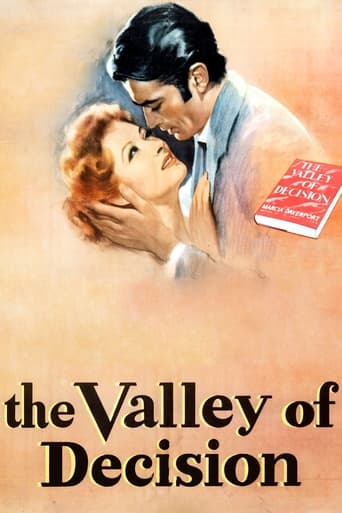turley57
I viewed this movie and fell in love with the story of a family who owned a Pittsburg Steel Mill. What a great movie where determination and love of the steel mills helped preserve and shape the USA into a world power. The portrayal of steel workers along side the upper class was particularly interesting, because the owners are showed as observers and not really part of the sweat and steel, until Gregory Peck gives an awe inspiring speech about what its like working on the ground floor of a steel mill. I particularly enjoyed Gregory and Greer's on screen relationship and the difficulty of romantic relationships between two different classes. I thoroughly enjoyed this movie.
alimpaul
Something about old films and the way the predictability does not inhibit viewing enjoyment. I really liked this movie and found it very strait-forward and pure. The acting was superb and the performances by Greer Garson and Gregory Peck were both fantastic as well as nice performances by the supporting actresses Marsha Hunt (Constance Scott) and Gladys Cooper (Clarissa Scott).A tale of and Irish-poor girl, Mary Rafferty (Garson), who finds love outside of her social status with Paul Scott (Peck), and heir to the families Steel fortune/mill...nothing real or avant-Gard happening but the truth of how love has no boundaries. I truly feel that this movie should be used as a blue-print to how Hollywood can portray a true love-without-boundaries type melodrama in the most exquisite and pure way.
rday-9
I happened to catch this one on TCM. I'd heard about how Peck was one of the few hunks left at home during WWII but was not as familiar with Miss Garson except for perhaps Goodbye Mr. Chips. Also, I am more a fan of Warner Brothers films than the glossy MGM fare. Nevertheless, I was captivated by this one. Garson plays with charming capability the Irish servant Mary to the Scott scion Peck against the backdrop of a Pittsburg steel mill. It's rather soap operatic but Peck manages to bring it down to earth. You could already see the Atticus Finch in him. Only Lionel Barrymore as Mary's bitter father manages to wreck things with his usual ham overacting. The story was also surprisingly politically correct with the servants, especially Mary, being treated more like cousins than workers as one might find in say, class conscious British films. The ending was a tad implausible but a happy one nonetheless. I would definitely add it to my rainy day, sick in bed with the flu, can't sleep insomniac collection.
dinky-4
Some critics referred to Marcia Davenport's massive 1942 best-seller as an American "Forsyte Saga" and Hollywood, not surprisingly, quickly bought up the film rights. What should have emerged as a grand family drama, however -- the sort of thing spanning decades and generations -- wound up in a shrunken and trivialized form which covered only the first half of the book and then in an abbreviated fashion. It's as if, somewhere along the way, everyone lost enthusiasm for the project. This is unfortunate since the book, though it tends to weaken in its final section covering the years from World War I to Pearl Harbor, tells an attention-keeping story filled with vibrant characters who manage to change and even surprise as the plot unfolds.While, at first glance, Greer Garson might seem a good choice to play Mary Rafferty, she's at least ten years too old for her part and this makes it a bit difficult to accept her romantic attachment to an obviously-younger Gregory Peck.Peck's siblings, so strong a force in the book, are here reduced to minor characters, though Marsha Hunt at least hints at what a fully-realized "Constance" might have been. One regrets at how much of their stories have been lost, particularly Constance's years in Europe.Curiously, the adaptors have chosen to create a character not in the book, (here played by Preston Foster), but this character does little to fill in the gaps caused by all the deletions.Donald Crisp seems slightly miscast as William Scott but he delivers the movie's best performance and is in pleasing contrast to the hammy Lionel Barrymore whose part has been clumsily expanded from that in the book.Davenport's book may today be found only in libraries and used-book stores but it's worth finding and reading and it would make a splendid basis for a multi-part mini-series which would have the time to tell the complete story. This mini-series, it is hoped, would do justice to the relationship between scion Paul Scott and housemaid Mary Rafferty -- a relationship more complex and unexpected than the one depicted in the movie and one which does not lend itself to the happy "fadeout" imposed by the writers at MGM.



